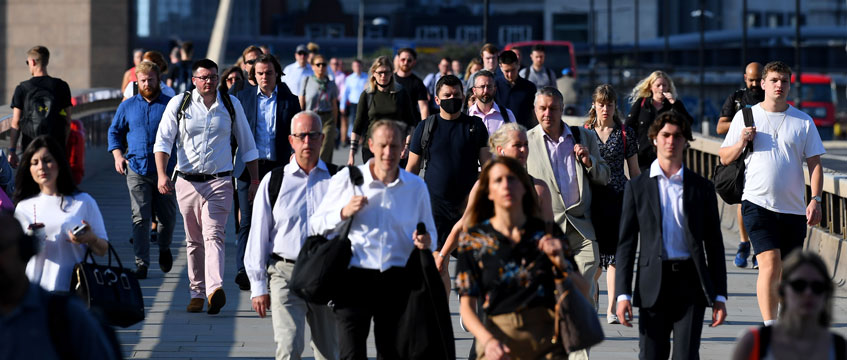London lags in the return to the office
Workers in central London now spend more than half of the working week – an average of 2.7 days – in the office. But although that marks a rise over recent months, it still places the capital behind several other major European cities.
A report from think tank Centre for Cities surveyed employers and employees in six cities on four continents. In Paris, workers are in the office for an average of 3.5 days per week, with the figure standing at 3.2 days in Singapore, 3.1 in New York, 2.8 in Sydney and 2.7 in Toronto.
More of London’s employers have introduced office mandates in the past year. The average employer in London mandates fewer days in the office – 3.1 – than counterparts in Sydney on 4, Singapore on 3.6 and New York, Toronto and Paris on 3.4, 3.3 and 3.2 respectively.
Workers in central London now spend more than half of the working week – an average of 2.7 days – in the office. But although that marks a rise over recent months, it still places the capital behind several other major European cities.
A report from think tank Centre for Cities surveyed employers and employees in six cities on four continents. In Paris, workers are in the office for an average of 3.5 days per week, with the figure standing at 3.2 days in Singapore, 3.1 in New York, 2.8 in Sydney and 2.7 in Toronto.
More of London’s employers have introduced office mandates in the past year. The average employer in London mandates fewer days in the office – 3.1 – than counterparts in Sydney on 4, Singapore on 3.6 and New York, Toronto and Paris on 3.4, 3.3 and 3.2 respectively.
In London, the youngest workers (aged 18-24) spend the most time working in the office on average each week, bucking the trend seen in the other cities surveyed. Younger workers are also the most likely out of all age groups to say they work best in the office.
Andrew Carter, chief executive of Centre for Cities, said: “There’s no substitute for the benefits gained thanks to face-to-face interaction, particularly for younger workers. Having access to the wide variety of activities and experiences that offices in city centres offer is crucial for them, and the businesses they work for, to be successful.
“London has huge assets – world-class public transport, deep labour markets and lots of cutting-edge firms. Encouraging more people back to the office, to be in line with other global cities, will enable the capital to continue to play the important national and international roles in the future.”
Chris Hayward, policy chairman and political leader at the City of London Corporation, said: “We are ready to support local businesses and central government bring workers back to the office… Attracting new businesses and people to a dynamic and thriving City is vital for the Square Mile’s future and we are excited to work with partners across London to do so.”
Photo by James Veysey/Shutterstock











